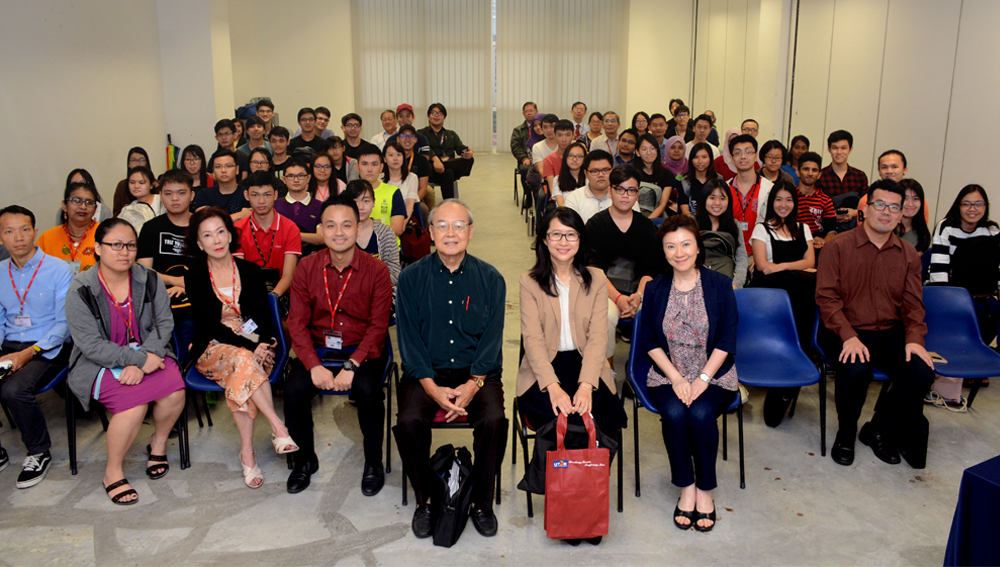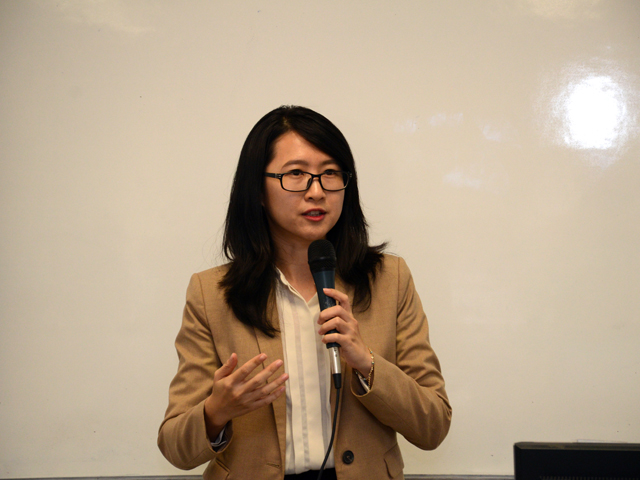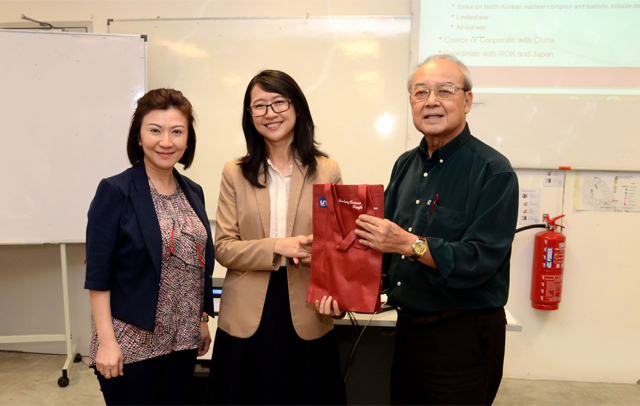

Dr Hoo (front row, second from right) with the participants
Survival is the basic objective of regimes of all nation-states; North Korea is no exception. There were reasonable expectations that this regime would soon collapse, but the fact was, it has survived for many decades and preserved not just its basic form of government but also the Kim dynasty.
To understand more on the reasons for North Korea’s longevity, Centre for Extension Education (CEE) in collaboration with Centre for International Studies (CIS) organised a talk titled Pyongyang's survival strategy:North Korea under Kim Jong-un at Sungai Long Campus on 25 October 2017. The talk aimed to provide an overview of the North Korean’s regime and address the questions of North Korean’s motivation, survival strategy, and its asymmetric dynamics against the regional powers.

Dr Hoo delivering her talk
The invited speaker was Dr Hoo Chiew-Ping, a senior lecturer from Universiti Kebangsaan Malaysia who is an expert on North Korea. Present at the talk were CIS General Manager Dr Leong Mun Yoon, CEE Director Lim Guat Yen, UTAR staff and students. At the beginning of the talk, Dr Hoo gave a brief introduction about North Korea, its system, and the Kim Dynasty. She also explained how each of the leaders has ensured the survival of North Korea, how they remained in power and also their ruling ideology.
When talked about the current despotic leader Kim Jong-un, Dr Hoo said, “Many people actually disliked him; it was very offensive and insulting to the older generation because he was too young. Kim Jong-un was very much aware that he was not liked in the political circle as well, so he used brutality like killing off his own uncle. Not only has that uncle been purged, but also his whole family line. This was the ideology of cleaning all the remains so that no one else can take revenge on you.”
She mentioned that such purges were the pattern in North Korea’s politics and Kim Jong-un was repeating what his father did. His father, Kim Jong-il also removed many of the senior advisors toconsolidate his control following his succeed. With that, Dr Hoo explained, “Their family cult is very strong.”
Moreover, Dr Hoo also explained to the audience about the issue of frozen North Korean bank accounts in Macau's Banco Delta Asia. “According to the witness of the conversation between Kim Jong-il and Jiang Zemin, also with Hu Jintao later on, Kim admitted that the financial sanction has hurt his regime a lot,” said Dr Hoo. She added that the imposition of the sanction infuriated him because their bank account in Delta Asia was not running anymore, and that bank was significant to link with many other local banks around the world, including the banks in Malaysia.
“Millions of dollars in the bank account was frozen. The US Treasury Department requested the Malaysian government to hand over the frozen fund, but sadly, both administrations, in order to have a good control over the nuclear crisis situation, offered to return the cash if Kim Jong-il agrees to demolish one of the nuclear facility—cooling tower. Kim Jong-il agreed to it, the cooling tower was demolished in late 2008 and the frozen fund were returned to the regime, which Kim Jong-il used to conduct the second nuclear test in 2009,” Dr Hoo said, “It was one of the major mistakes that both administrations have made.”
Started with Kim Il-sung, North Korea's nuclear weapons programme has grown with each Kim’s regime. Compared to his father and grandfather, however, Kim Jong-un was more aggressive in advancing the North Korea’s nuclear programme, ignoring the international concerns and refusing to negotiate, according to Dr Hoo.
Apart from that, North Korean schools educated their people to worship Juche and Kim. All their subjects were imbued with nationalistic and scientific content. “The process of elite selection was intensive. They identify subjects who have special capability in expanding physic and scientific work, and send the excelled ones to Russia or China to pursue their study,” told Dr Hoo.
When the recent assassination of Kim Jong-nam, Kim Jong-un’s estranged half-brother, took place, people began questioning, “Is Malaysia important to the North Korea?” Dr Hoo said the answer was absolutely, yes.
“You have to be part of the family in order to hold the important position. The previous ambassador of North Korea to Malaysia was actually the nephew of Jang Song Thaek, who was Kim Jong-il’s brother-in-law and also the uncle of Kim Jong-un. Having a diplomat with significant family tie to Kim’s regime posted in a particular embassy signifies that specific country is very important to North Korea,” said Dr Hoo. She also pointed out that the embassy in Malaysia is of particular significance because it is one of the few countries, outside China, with direct flights to Pyongyang.

Dr Leong (far right) presenting a token of appreciation to Dr Hoo (centre), while Lim looks on
© 2019 UNIVERSITI TUNKU ABDUL RAHMAN DU012(A).
Wholly owned by UTAR Education Foundation Co. No. 578227-M LEGAL STATEMENT TERM OF USAGE PRIVACY NOTICE